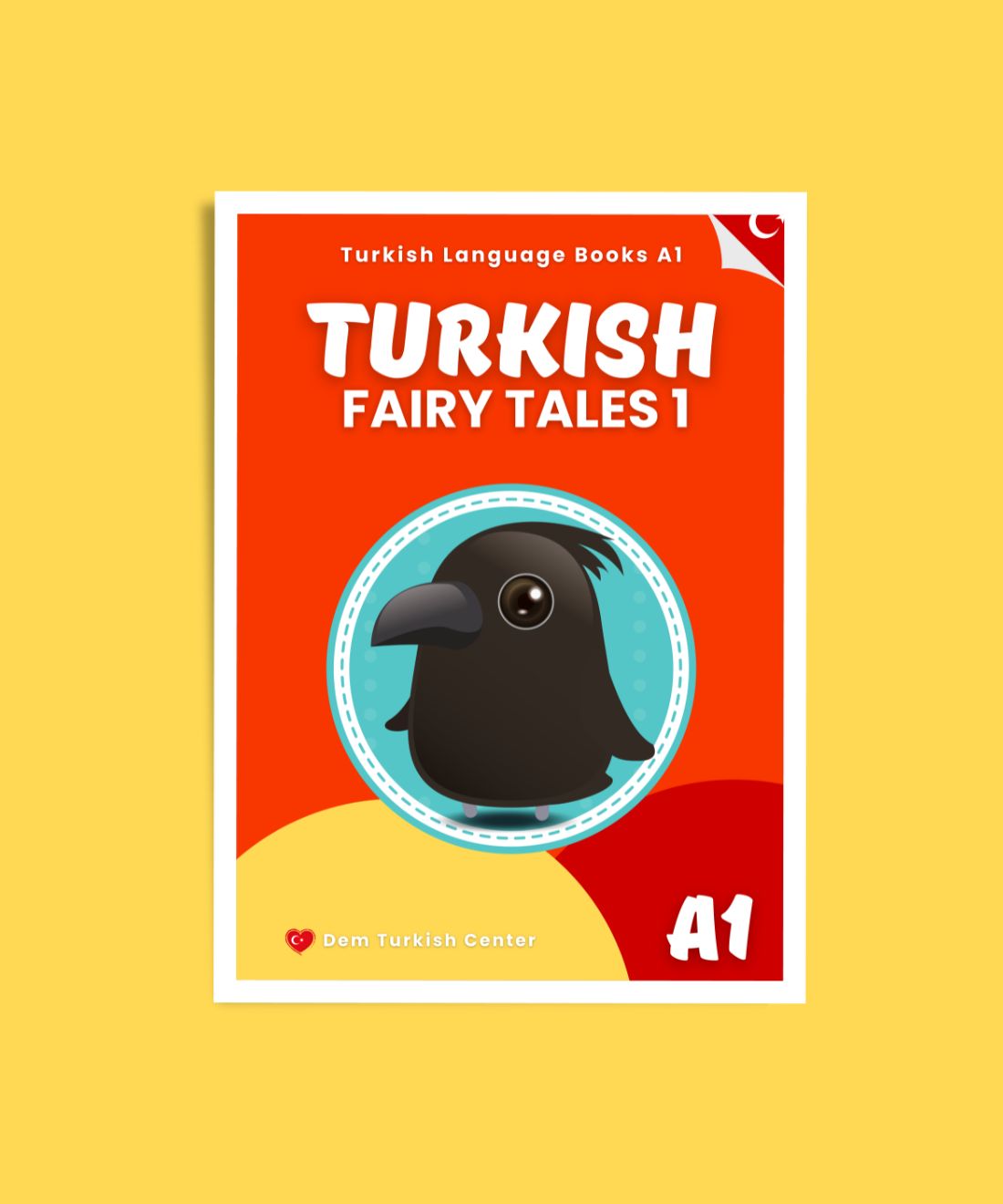
Verb To Be in Turkish Language
"Verb To Be" in Turkish is formed with personal suffixes. Learn how to form "Verb To Be" in this short Turkish lessons for beginners.
Please feel free to use the comment form below if you have questions or need help with this form.
Download Turkish Grammar Course 1 A1
"Verb To Be" in Turkish
First check out the examples below and then learn how to use "Verb To Be" in Turkish with all the persons:
- Ben bir doktorum. I am a doctor.
- Sen bir doktorsun. You are a doctor.
- O bir doktor. He is a doctor.
- Biz doktoruz. We are doctors.
- Siz doktorsunuz. You are doctors.
- Onlar doktor(lar). They are doctors.
Now learn the persons and the verb to be in Turkish.
Learn Turkish grammar with Turkish grammar classes (A1) online!
"I am" in Turkish
The suffix for "AM" in Turkish is "- (Y) İM / ÜM / IM / UM" depending on the vowel harmony. If the last letter of the word is a vowel, then you are using the buffer "Y". For example:
- Ben bir öğretmenim. I am a teacher.
- Ben evliyim. I am married.
- Ben bir profesörüm. I am a professor.
- Ben Türküm. I am Turkish.
- Ben hastayım. I am sick.
- Ben bir kadınım. I am a woman.
- Ben mutluyum I am happy.
NEGATIVE FORM: I AM NOT
The word "Değil" in Turkish is "Not" in English. "Ben ... değilim" is "I am not". For example:
- Ben evli değilim. I am not married.
- Ben Türk değilim. I am not Turkish.
- Ben mutlu değilim. I am now happy.
YES / NO QUESTIONS: AM I?
The word "miyim / müyüm / mıyım / muyum? (depending on the last vowel of the word)" in Turkish is "Am I?" in English. It's a separate word. For example:
- Ben evli miyim? Am I married?
- Ben Türk müyüm?. Am I Turkish?
- Ben mutlu muyum? Am I happy?
"You are (Singular You)" in Turkish
The suffix for "ARE (Singular second person)" in Turkish is "- SİN / SÜN / SIN / SUN" depending on the vowel harmony. For example:
- Sen bir öğretmensin. You are a teacher.
- Sen evlisin. You are married.
- Sen bir profesörüm. I am a professor.
- Sen Türksün. You are Turkish.
- Sen hastasın. You are sick.
- Sen bir kadınsın. You are a woman.
- Sen mutlusun You are happy.
NEGATIVE FORM: YOU ARE NOT
The word "Değil" in Turkish is "Not" in English. "Sen ... değilsin" is "You are not". For example:
- Sen evli değilsin. You are not married.
- Sen Türk değilsin. You are not Turkish.
- Sen mutlu değilsin. You are not happy.
YES / NO QUESTIONS: ARE YOU?
The word "misin / müsün / mısın / musun (depending on the last vowel of the word?" in Turkish is "Are you?" in English. It's a separate word. For example:
- Sen evli misin? Are you married?
- Sen Türk müsün?. Are you Turkish?
- Sen mutlu musun? Are you happy?
"He is" in Turkish
There is no "IS", no suffix for the third person (He, She, It is). For example:
- O bir öğretmen. She is a teacher.
- O evli. She is married.
- O bir profesör. She is a professor.
- O Türk. She is Turkish.
- O hasta. She is sick.
- O bir kadın. She is a woman.
- O mutlu. She is happy.
NEGATIVE FORM: HE IS NOT
The word "Değil" in Turkish is "Not" in English. "O ... değil" is "He / She / It is not". For example:
- O evli değil. He is not married.
- O Türk değil. He is not Turkish.
- O mutlu değil. He is not happy.
YES / NO QUESTIONS: IS HE?
The word "mi / mü / mı / mu (depending on the last vowel of the word)?" in Turkish is "Is he / she / it?" in English. It's a separate word. For example:
- O evli mi? Is she married?
- O Türk mü?. Is she Turkish?
- O mutlu mu? Is she happy?
"We are" in Turkish
The suffix for "ARE (plural first person, We" in Turkish is "- (Y) İZ / ÜZ / IZ / UZ" depending on the vowel harmony. If the last letter of the word is a vowel, then you are using the buffer "Y". For example:
- Biz öğretmeniz. We are teachers.
- Biz evliyiz. We are married.
- Biz profesörüz. We are professors.
- Biz Türküz. We are Turkish.
- Biz hastayız. We are sick.
- Biz kadınız. We are women.
- Biz mutluyuz We are happy.
NEGATIVE FORM: WE ARE NOT
The word "Değil" in Turkish is "Not" in English. "Biz ... değiliz" is "We are not". For example:
- Biz evli değiliz. We are not married.
- Biz Türk değiliz. We are not Turkish.
- Biz mutlu değiliz. We are not happy.
YES / NO QUESTIONS: ARE WE?
The word "miyiz / müyüz / mıyız / muyuz? (depending on the last vowel of the word)" in Turkish is "Are we?" in English. It's a separate word. For example:
- Biz evli miyiz? Are we married?
- Biz Türk müyüz?. Are we Turkish?
- Biz mutlu muyuz? Are we happy?
"You are (Plural You)" in Turkish
The suffix for "ARE (plural second person, You" in Turkish is "- SİNİZ / SÜNÜZ / SINIZ / SUNUZ" depending on the vowel harmony. For example:
- Siz öğretmensiniz. You are teachers.
- Siz evlisiniz. You are married.
- Siz profesörsünüz. You are professors.
- Siz Türksünüz. You are Turkish.
- Siz hastasınız. You are sick.
- Siz kadınsınız. You are women.
- Siz mutlusunuz You are happy.
NEGATIVE FORM: YOU ARE NOT
The word "Değil" in Turkish is "Not" in English. "Siz ... değilsiniz" is "You are not". For example:
- Siz evli değilsiniz. You are not married.
- Siz Türk değilsiniz. You are not Turkish.
- Siz mutlu değilsiniz. You are not happy.
YES / NO QUESTIONS: ARE YOu?
The word "misiniz / müsünüz / mısınız / musunuz? (depending on the last vowel of the word)" in Turkish is "Are you?" in English. It's a separate word. For example:
- Siz evli misiniz? Are you married?
- Siz Türk müsünüz?. Are you Turkish?
- Siz mutlu musunuz? Are you happy?
"They are" in Turkish
There is no suffix for the third person singular (He, She, It is) and plural (They). However, you can use the plural suffix (- ler / lar) for the plural third person (They). For example:
- Onlar öğretmen(ler). They are teachers.
- Onlar evli(ler). They are married.
- Onlar profesör(ler). They are professors.
- Onlar Türk(ler). They are Turkish.
- Onlar hasta(lar). They are sick.
- Onlar kadın(lar). They are women.
- Onlar mutlu(lar). They are happy.
NEGATIVE FORM: THEY ARE NOT
The word "Değil" in Turkish is "Not" in English. "Onlar ... değil(ler)" is "They are not". For example:
- Onlar evli değil(ler). They are not married.
- Onlar Türk değil(ler). They are not Turkish.
- Onlar mutlu değil(ler). They are not happy.
YES / NO QUESTIONS: ARE THEY?
The word "mi / mü / mı / mu (depending on the last vowel of the word)?" in Turkish is "Are they?" in English. It's a separate word. For example:
- Onlar evli(ler) mi? Are they married?
- Onlar Türk(ler) (mi) mü?. Are they Turkish?
- Onlar mutlu(lar) (mı) mu? Are they happy?
We hope you found this short Turkish lesson useful. Please use the form below if you have questions about "Verb To Be" in Turkish.
BECOME A DEM TURKISH CENTER MEMBER!
Thank you very much for your interest and visiting Dem Turkish Center bookstore. We hope our Turkish language courses and lessons will be very helpful for your Turkish studies.














